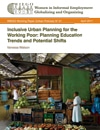Inclusive Urban Planning for the Working Poor: Planning Education Trends and Potential Shift
Current urban planning education, supported by prevailing legislation, negatively impacts on the livelihoods and shelter options of the urban poor while serving formal economic (and elite) interests, resulting in socially and spatially exclusive urban environments.
This paper outlines and critically assesses trends in planning education across the globe, specifically in countries of the global South, and the extent to which curricula address issues of inclusivity and planning for the working poor. It also sets out the current organizational structure of planning education, and how regional associations relate to a global network of planning schools.
The paper concludes with a set of recommendations as to how WIEGO and its affiliates should engage – internationally, regionally and locally – with planners and curricula. Research gaps relating to the impact of planning on informal work are also identified.
View list of all: Working Papers

